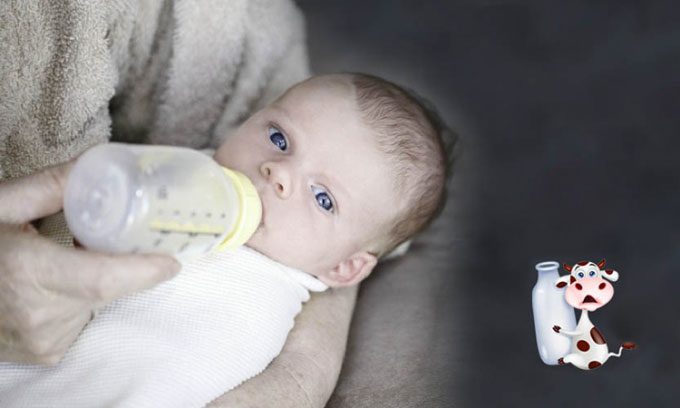Experts at Cincinnati Children’s Hospital Explain Why Cow’s Milk Should Not Replace Breast Milk or Formula for Infants Under 12 Months
Dr. Jae Kim, Director of the Neonatology Department at Cincinnati Children’s Hospital in the U.S., told Live Science that cow’s milk contains proteins that are difficult for infants to digest, and it lacks essential vitamins and minerals, such as iron, that babies need for development.
Although infant formula is made from cow’s milk, manufacturers remove and modify the proteins before adding them back along with other essential ingredients. Therefore, the final formula is quite different from cow’s milk.
Kim noted that an infant’s intestines, kidneys, and immune system need time to develop before they can safely tolerate the types and amounts of proteins found in cow’s milk.

Infants under 12 months should not drink cow’s milk instead of breast milk or formula. (Photo: Simbolics)
According to the American Academy of Pediatrics (AAP), the high concentrations of protein and minerals in cow’s milk can stress an infant’s kidneys and may lead to severe illness during times of heat, fever, or diarrhea. This is why “we recommend that people do not give cow’s milk to children in their first year of life,” Kim emphasized.
The expert noted that most infants over 6 months may prefer cow’s milk, but the unfamiliar proteins can cause inflammation due to allergic reactions in some children.
These allergic reactions can lead to intestinal inflammation or microscopic bleeding in the lining of the child’s intestines, and the lack of iron in cow’s milk can result in anemia. Overall, it may cause the child to be underdeveloped or unhealthy.
“Be aware of any signs and symptoms of inflammation or allergic reactions,” Kim added. Infants may not have an immediate reaction to cow’s milk, but gradually, they may start to spit up or have diarrhea more frequently. In severe cases, there may be some blood in the child’s stool due to colitis, an inflammation of the colon, or the child may experience swelling, especially in the face, and anemia due to protein loss in the blood.
The risk of allergic reactions decreases as children grow older and eat more. Older children have more mature intestines, kidneys, and immune systems to tolerate new proteins. In fact, for the vast majority of infants over 6 months old, consuming cow’s milk as a supplemental source of nutrition usually does not cause any issues. If you are concerned about what your child should drink, the AAP recommends consulting with pediatricians.




















































